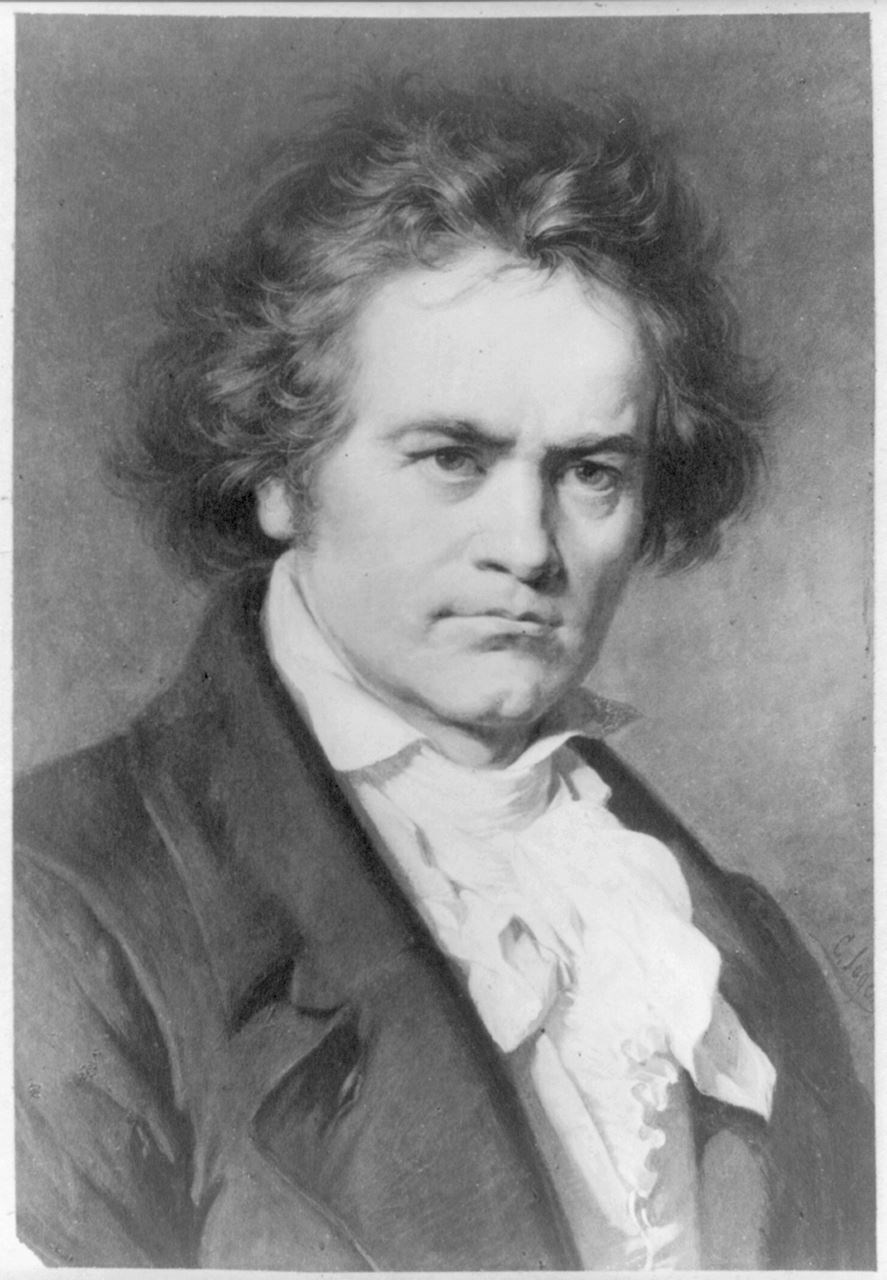Martin Luther King Jr., George Washington, and Gandhi are well-known and recognized heroes; however, not all heroes are easily seen, such as the composer and pianist Ludwig van Beethoven. Unlike these well-used examples, Beethoven didn’t directly help others in need with his actions, but he indirectly helped with his music. In 1770 in Bonn, Vienna, Ludwig van Beethoven was born to his father, Johann van Beethoven, and his mother, Maria Magdalena Keverich. From a young age, Beethoven was talented on the piano and was taught by famous names, like Haydn and Mozart. Although he was quite sickly, with the most troubling and yet most notable being his diminishing hearing, Beethoven continued to compose music until his death on March 26, 1827. A hero should possess commitment -- the ability to pursue a goal, and brilliance -- being unique or smarter than those around them. Ludwig van Beethoven is a hero because he was committed and brilliant, and therefore, he inspires others to improve and work harder to follow what they truly want.
 https://commons.wikimedia.org/wiki/File:Beethoven.jpgJoseph Karl Stieler [Public domain]Heroes should be committed to what they are passionate about, just how Beethoven pursued his career in music. Beethoven’s continually disappearing hearing plagued him for his entire life until “by the time he conducted the premiere of his Ninth Symphony in 1824, he was totally deaf” (“Ludwig van Beethoven”). Even after he lost all his hearing, Beethoven still pursued his work and conducted. He may not have been able to hear his music, but he loved creating it. Ever since he was a child, Beethoven switched from teacher to teacher to improve his music when he settled with Haydn for a time. “As a composer, however, Beethoven still had several technical problems to overcome, and it soon became clear that Haydn was not the optimal person to help him...Beethoven soon began taking extra lessons in secret” (Budden and Knapp). To continue his learning, Beethoven took other lessons despite his current lessons with Haydn. He had realized that the way Haydn was teaching him wasn’t the way he wanted to play music, so he sought out other teachers. Although he didn’t need to do so, he was passionate about his work and wasn’t afraid to change his ways to become a more superior composer. Committing countless years into a job or a hobby and actively searching out for help is what a hero does.
https://commons.wikimedia.org/wiki/File:Beethoven.jpgJoseph Karl Stieler [Public domain]Heroes should be committed to what they are passionate about, just how Beethoven pursued his career in music. Beethoven’s continually disappearing hearing plagued him for his entire life until “by the time he conducted the premiere of his Ninth Symphony in 1824, he was totally deaf” (“Ludwig van Beethoven”). Even after he lost all his hearing, Beethoven still pursued his work and conducted. He may not have been able to hear his music, but he loved creating it. Ever since he was a child, Beethoven switched from teacher to teacher to improve his music when he settled with Haydn for a time. “As a composer, however, Beethoven still had several technical problems to overcome, and it soon became clear that Haydn was not the optimal person to help him...Beethoven soon began taking extra lessons in secret” (Budden and Knapp). To continue his learning, Beethoven took other lessons despite his current lessons with Haydn. He had realized that the way Haydn was teaching him wasn’t the way he wanted to play music, so he sought out other teachers. Although he didn’t need to do so, he was passionate about his work and wasn’t afraid to change his ways to become a more superior composer. Committing countless years into a job or a hobby and actively searching out for help is what a hero does.
 https://commons.wikimedia.org/wiki/File:Beethoven_.jpgKarl Jäger [Public domain]Being more creative and intelligent or overall being more brilliant than others is the other half of what makes a hero. Though there were numerous composers in his time, Beethoven’s compositions were in a different class than his peers when “his middle-period and late works developed so far beyond these traditions that they anticipated some of the major musical trends of the late 19th century” (“Ludwig van Beethoven”). Not only did he compose stunning pieces, but Beethoven set the example of what future music should be. The way music sounds in the 19th century was determined by Beethoven. He was clearly far more clever and inspiring than other composers of his time, which was the product of his brilliance. Despite the 18th and 19th centuries having a multitude of fine musicians, “In the age of sensibility he could move an audience to tears more easily than any other pianist of the time” (Budden and Knapp). No matter how many other talented pianists there were, including the famous Mozart, Beethoven had more skill and talent. He was musically sensitive, meaning that Beethoven could play the piano how he wanted to play it. Having more ingenuity than others, or in Beethoven’s case composing greater music, is a quality all heroes have.
https://commons.wikimedia.org/wiki/File:Beethoven_.jpgKarl Jäger [Public domain]Being more creative and intelligent or overall being more brilliant than others is the other half of what makes a hero. Though there were numerous composers in his time, Beethoven’s compositions were in a different class than his peers when “his middle-period and late works developed so far beyond these traditions that they anticipated some of the major musical trends of the late 19th century” (“Ludwig van Beethoven”). Not only did he compose stunning pieces, but Beethoven set the example of what future music should be. The way music sounds in the 19th century was determined by Beethoven. He was clearly far more clever and inspiring than other composers of his time, which was the product of his brilliance. Despite the 18th and 19th centuries having a multitude of fine musicians, “In the age of sensibility he could move an audience to tears more easily than any other pianist of the time” (Budden and Knapp). No matter how many other talented pianists there were, including the famous Mozart, Beethoven had more skill and talent. He was musically sensitive, meaning that Beethoven could play the piano how he wanted to play it. Having more ingenuity than others, or in Beethoven’s case composing greater music, is a quality all heroes have.
Heroes are committed and brilliant -- characteristics Ludwig van Beethoven had, and inspire others to exceed their own expectations. Actively lending a hand to those in need, or making a change to the way people think isn’t what all heroes do. Instead, they are merely the ones who are widely recognized and celebrated, such as Martin Luther King Jr. Day or Lincoln’s birthday. However, people who have the previously stated characteristics are just as heroic as Rosa Parks or J.K. Rowling. Beethoven has inspired others to ameliorate their own work, by striving to their goal without hesitation. No matter the obstacle or drawback, with enough commitment and brilliance, any seemingly impossible objective can be done.
Works Cited
Budden, Julian Medforth, and Raymond L. Knapp. “Ludwig Van Beethoven.” Encyclopædia Britannica,
Encyclopædia Britannica, Inc., 22 Mar. 2019,
"Ludwig van Beethoven." Encyclopedia of World Biography Online, Gale, 1998. Biography In Context,
https://link.galegroup.com/apps/doc/K1631000534/BIC?u=powa9245&sid=BIC&xid=05286e53.
Accessed 29 Apr. 2019.
"Ludwig van Beethoven." World Eras, edited by James R. Farr, vol. 9: Industrial Revolution in Europe,
1750-1914, Gale, 2002. Biography In Context,
https://link.galegroup.com/apps/doc/K1646900005/BIC?u=powa9245&sid=BIC&xid=c93bb0be.
Accessed 29 Apr. 2019.
Steiner, R. "Ludwig van Beethoven." New Catholic Encyclopedia, Gale, 2003. Biography In Context,
https://link.galegroup.com/apps/doc/K3407701253/BIC?u=powa9245&sid=BIC&xid=85622cd2.
Accessed 29 Apr. 2019.
Page created on 5/14/2019 2:29:02 AM
Last edited 10/27/2024 4:49:10 PM
